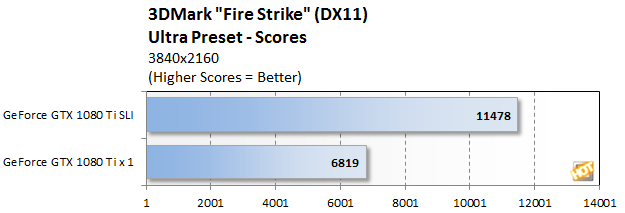NVIDIA GeForce GTX 1080 Ti Review - The Fastest Gaming Graphics Card Yet
Since AMD’s just-released Ryzen 7 series processors are such a hot topic lately, we also popped a GTX 1080 Ti in a Ryzen 7 1800X powered system to see how it performed there as well...
|




We saw significant increases in performance in the DirectX 11 tests, in the neighborhood of 38% - 69% depending on the application. We did not have much luck in the DirectX 12 tests, however. Hitman didn't scale and Ashes Of the Singularity wouldn't even let us enable its multi-GPU option. Keep in mind, multi-GPU support is still a work in progress with DirectX 12, however.
|











The GeForce GTX 1080 Ti's results when tested on the AMD Ryzen 7 1800X are a mixed bag. In some tests, where the GPU is being hammered -- like the 4K runs -- there isn't much of a gap separating Ryzen from the Core i7-6900K in our updated graphics test bed. Unfortunately, there is a significant delta separating the platforms in some of the 1440P tests, and games like Rise Of The Tomb Raider and Ashes take a tumble on Ryzen.
Since our initial Ryzen coverage, we have updated our test bed with a few new BIOS revisions, and have run into some stability issues as well. Ashes Of The Singularity, for example, couldn't complete a run-through at 4K, though the system would shut-down consistently if any game was left running for an extended period, and clearing the CMOS was the only way to bring it back up.
AMD and its board partners are still feverishly optimizing their BIOS / firmwares for Ryzen, and news of a Windows 10 scheduler issue with AMD's new processors is trickling out as well. We're reporting these results because they're repeatable and representative of what the platform can achieve today, but fully expect things to evolve and change in the coming weeks.







